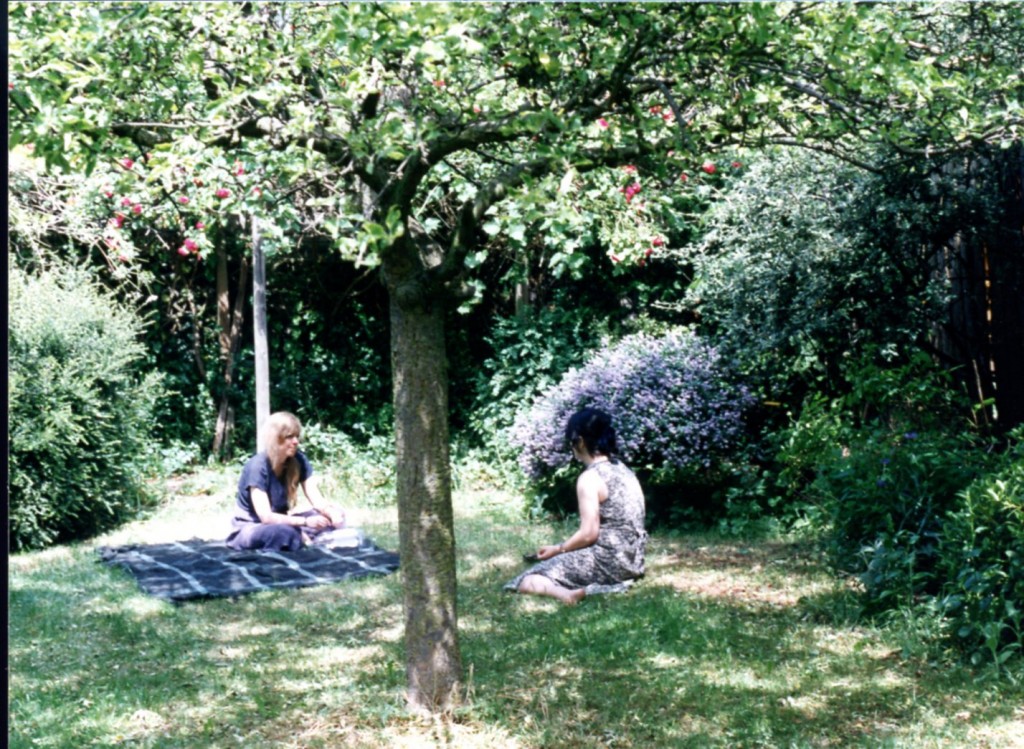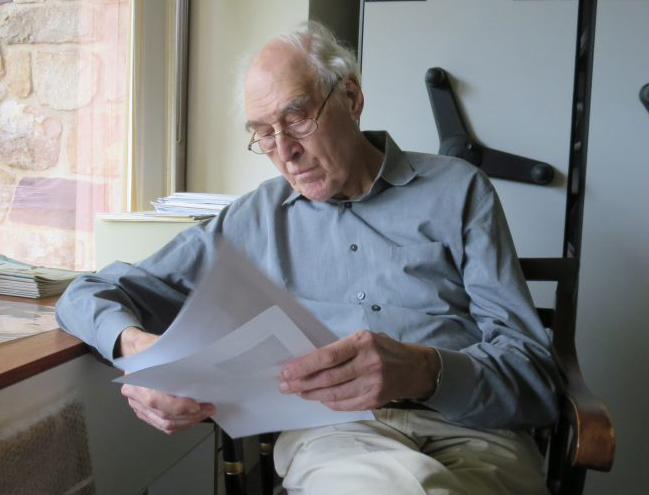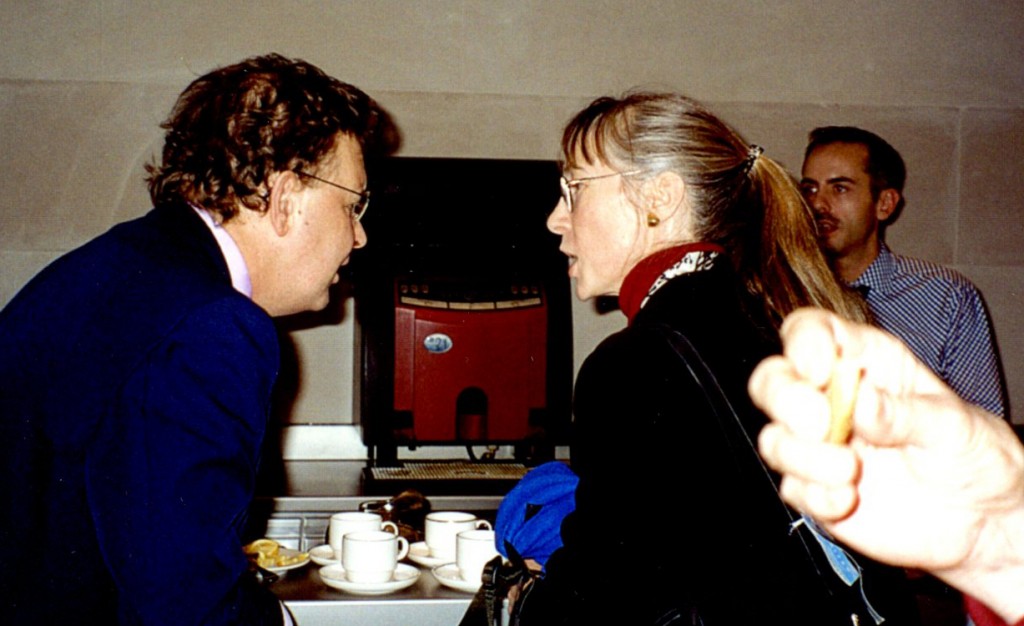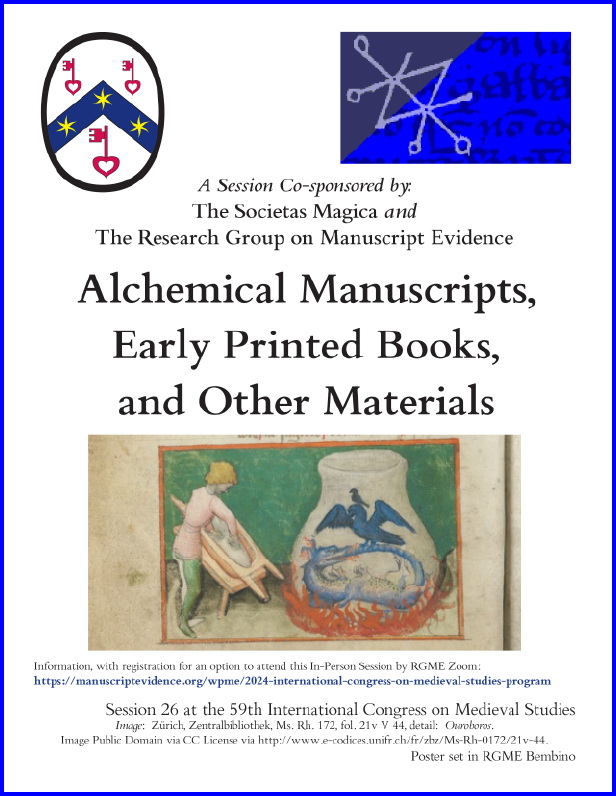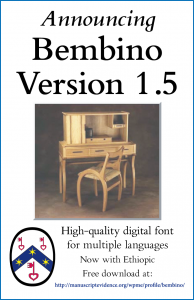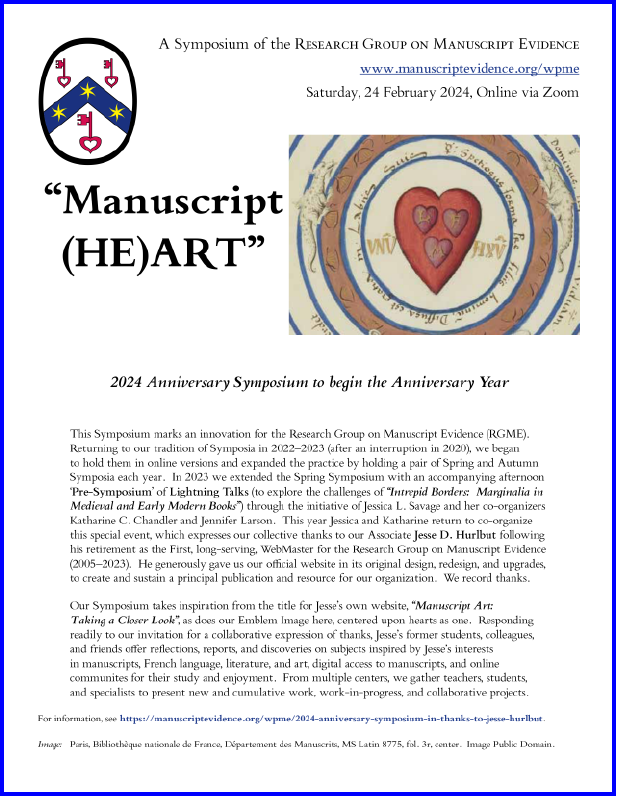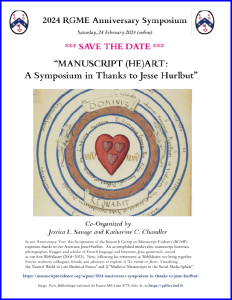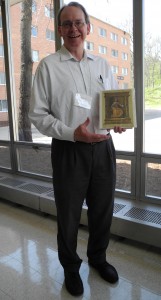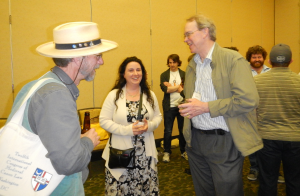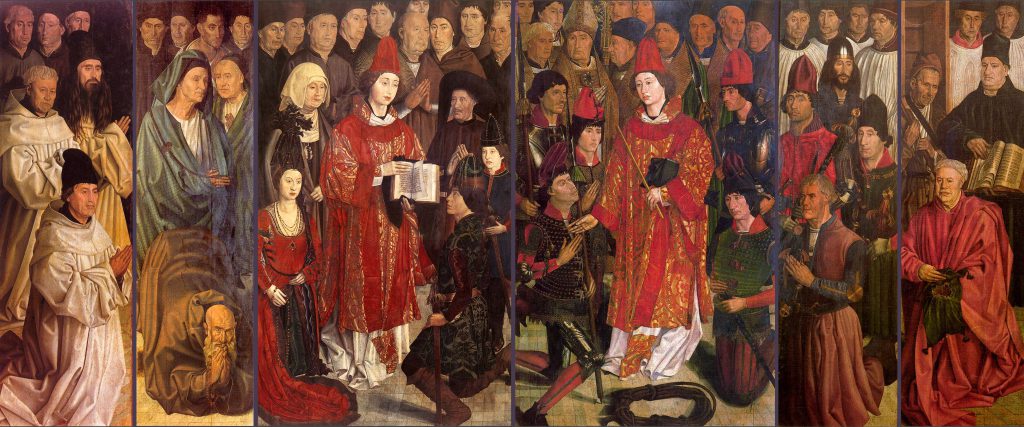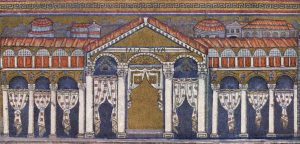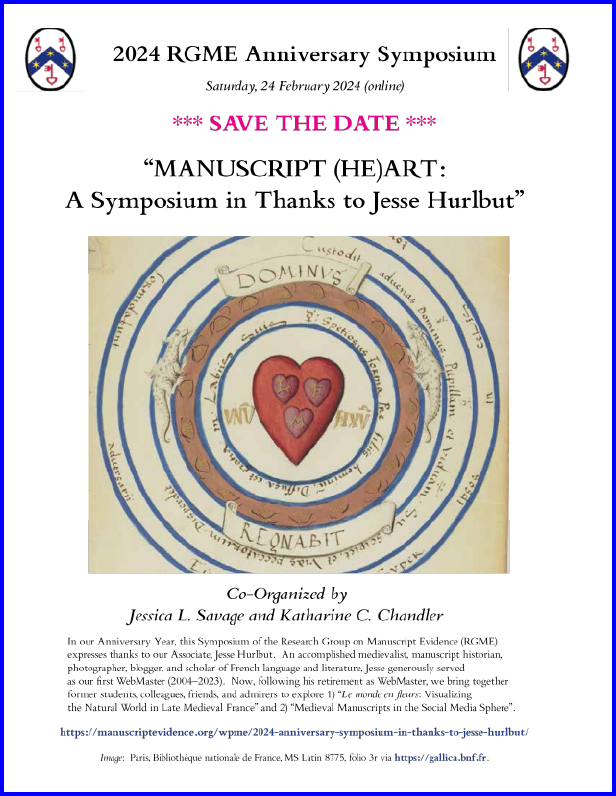Announcement
2024 Grant to the RGME from
The Gladys Krieble Delmas Foundation
Research Libraries Program
for
A Year-Long Project with Paired Symposia
“Between Past and Future”
(Parts I–II)
[Posted on 5 April 2024]
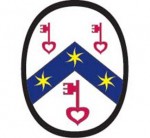
RGME Logo in Color (2014).
Gratefully we announce that The Gladys Krieble Delmas Foundation, through its Research Libraries Program, has awarded the Research Group on Manuscript Evidence (RGME) a grant for 2024 to carry out a one-year Project centered upon our Spring and Autumn Symposia in this Anniversary Year as a co-ordinated set of events. Drawing upon fruits of the 2023 Project for our Library & Archives funded by the Foundation, this year’s grant in our Anniversary Year creates a new Project focused upon links between Special Collections and Teaching for the Liberal Arts.
“Between Past and Future:
RGME Spring & Autumn Symposia in 2024
for Teaching in the Liberal Arts with Original Sources,
at Vassar College and Beyond”
Last year, we focused upon the task of “Building the Plan for Recording, Structuring, and Accessing the RGME Library & Archives”. Now, we launch the work of crafting a set of events centered upon a return to our in-person Symposia and their follow-up in the plan for our 2024 Spring and Autumn Symposia.
Building upon RGME integrated approaches across the years, these events are expressly dedicated to building bridges to aid passage across obstacles and standing watch on the bridge of a vessel poised to steer an enlightened course. Our voyage contemplates connections “Between Past and Future” , specifically for encountering myriad original sources, as found notably in Special Collections, and considering them as opportunities for “Teaching Events”.
This year’s Project embarks on a fresh campaign, as it builds upon last year’s funded Project to begin the process of structuring our Library & Archives as a collection.
Both grants have been awarded through the Research Libraries Program, for which “the overall objective . . . is to improve the ability of research libraries to serve the needs of scholarship in the humanities and the performing arts, and to help make their resources more widely accessible to scholars and the general public.”
“Between Past and Future”: The Way Forward
The project funded by The Gladys Krieble Delmas Foundation Grant will span the entirety of the 2024 calendar year, concluding with an end-of-the-year report.
Building upon the 2023 Pilot Project for the RGME Library & Archives, the 2024 year-long Project centers upon our Spring Symposium taking place at Vassar College in April in hybrid format, at the invitation of Head of Special Collections, Ronald D. Patkus, familiar as participant (2019–2023) with our Symposium Series both in-person and online. Enthusiasm among speakers, respondents, presiders, consultants, and others joining the 2024 Spring Symposium Program informs the plan to create a curated set of RGME Symposia which not only co-produce this exceptional event, but also follow from it. (The Spring Symposium Program is available in pdf as consecutive pages or foldable booklet.)
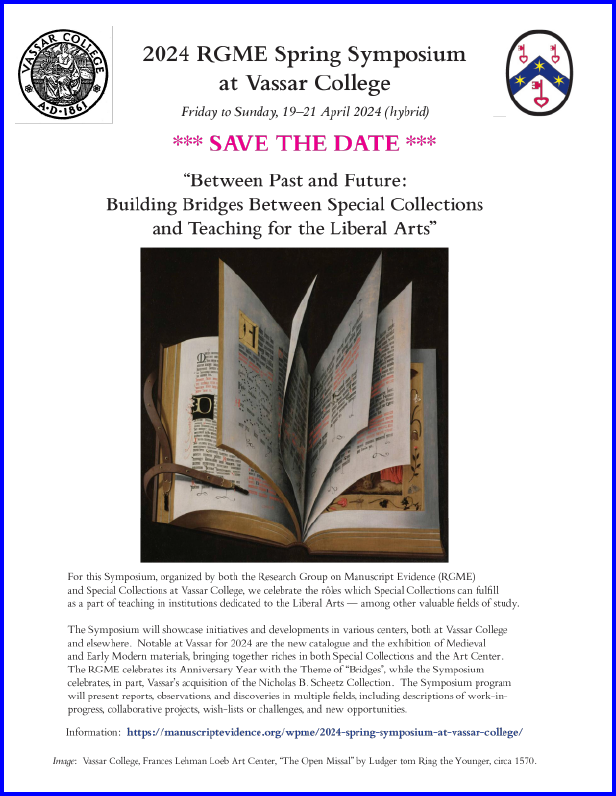
Poster 1: Save-the-Date for 2024 Spring Symposium at Vassar.
The 2024 Autumn Symposium makes it possible to undertake an integrated follow-up for the Spring event without burdening Vassar with organizational work, by using RGME structures of paired Spring & Summer Symposia and our various other online events. They all function mainly through pro-bono donations, from pre-production through post-production and follow-up, to involve minimal expenses, for which regularly we must seek support above our organization’s expenses.
As a one-day online event, the Autumn Symposium has its program partly in place, with some participants from the Spring Symposium and openings to be filled through it, notably by meetings for planning at and around the Spring Symposium. In this flexible way, the ‘casting’ of the Autumn Symposium as a set of “Teaching Events” can assemble its program with relative ease of preparation to ‘enact’ the processes of teaching through encounters with Special Collections, for in-person and online audiences alike.
The 2024 Project is grounded upon our practice to interlink events (notably Symposia) and to employ a flexible, structured, approach to programming. Here we integrate the work for the Spring Symposium at Vassar College with some “first fruits” soon in a shorter event online, much like the paired events of earlier Spring & Autumn Symposia which grew from our occasional Symposia over the years. Examples include our
Both 2024 events have companion RGME publications, both digital and printed. They comprise webposts, blogposts, paired posters (preview, program), recordings, and more, notably the illustrated Symposium Booklets. We publish them mostly by pro-bono work from start to final proof, for issue in print and pdf. Costs for their printing and distribution (at in-person events and by mail as required) call for support.
The perspectives on the theme of the Spring Symposium present a coherent, multi-disciplinary, and multi-generational scholarly program in a sequence of teaching events with expertise and materials in multiple centers. They stand poised, as proclaimed by the Symposium title
- “Between Past and Future: Building Bridges between Special Collections and Teaching for the Liberal Arts”.
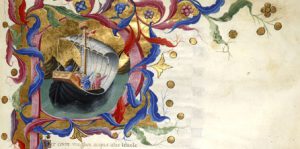
London, The British Library, Yates Thompson MS 36, fol. 65r, top left. Historiated initial enclosing a ship under sail with the poets Dante and his guide Vergil. Dante Alighieri, Divina Comedia, Canto 1, Purgatorio. Northern Italy, 15th century.
The Autumn Symposium carries it forward with a selection of virtual visits placed
- “At the Helm: Spotlight on Special Collections as Teaching Events”.
This follow-up event allows presenters the opportunity, with minimal preparation, to showcase collections (public and private) in virtual visits guided by curators, in the company of teachers and students both on-site and online. The informal style accords with our proven approach for online events as roundtables, interviews, conversations, master classes, and workshops.
Thus, we might channel the purposeful momentum for the Spring Symposium in its central event and a simpler follow-up with participants including Vassar representatives: faculty, staff, students, and alums.
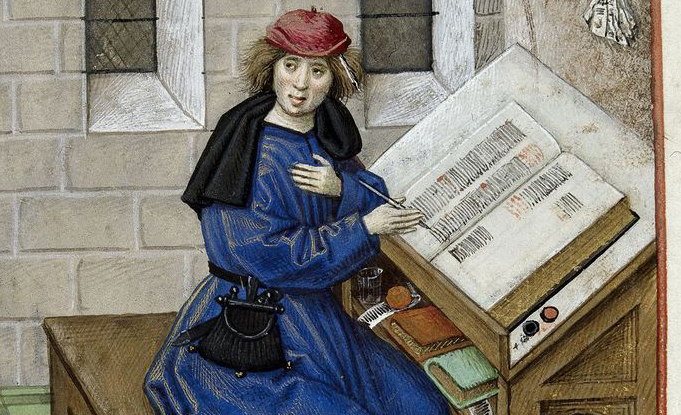
© The British Library, London, Harley MS 4425, fol. 133r, detail. Jean de Meun (c. 1240 – c. 1305), Roman de la Rose. Portrait of the author at his writing desk.
Center Stage
The Vassar Symposium in the Spring occupies center stage for the Project. Taking place in hybrid format from Friday to Sunday 19–21 April 2024, this event gathers participants at Vassar by invitation, with attendees both in person and online.
Its production rests upon organizational work and resources from both Vassar College and the RGME, guided by a Spring Symposium Advisory Planning Committee comprising Ronald Patkus, Elizabeth Lastra, Mildred Budny, and Barbara Williams Ellertson. The event expressly showcases
It also celebrates
Vassar College’s resources, people, and representatives stand as focus, as the scope attends also to a wider context of accomplishments. Thus will gather experts and practitioners in the fields of Special Collections, teaching, learning, and the Liberal Arts, with speakers from different centers (also abroad) and stages or directions of engagement. They include librarians, archivists, curators, collectors, manuscript and rare-book vendors, faculty, students, and former students working in the field. Featured contributions include reports by recent Vassar College alumnae working with Special Collections, current Vassar students engaging with materials in the Vassar collections, and Vassar alums of longer duration revisiting and reviving such engagement.
The Autumn Symposium in online format on Saturday 26 October 2024, also with ancillary events, continues the engagement between original sources — medieval and more, across centuries, genres, styles, and languages — and the people who study and care for them, teach from them, and learn from them. Among them on the Programs for both Symposia are representatives from Vassar, both present and past.
As follow-up and follow-through, the Autumn Symposium offers virtual, curated visits to Special Collections of several kinds, institutional and private, with focus upon original materials, as witnesses with their own stories to tell. Its online visits (in this country and abroad) will showcase collections and programs dedicated to promoting pedagogy. One, by request, would exhibit some highlights of RGME Library & Archives, as revealed in our 2023 funded Pilot Project, along with results of our on-going research on manuscripts and related materials in our own and others’ collections.
The Plan for the Project
The grant for 2024 gives support for multiple aspects of the work to organize and accomplish both Symposia and to integrate them both with each other as a co-ordinated set and with the other RGME activities throughout the year. Among the funded elements are provisions for organizational logistics including online and in-person technical and logistical back-up for the paired Symposia, the preparations of their publications (traditional and digital) from conception through distribution, and the part-time services of an Intern Executive Assistant/Associate to aid the RGME Director to plan, refine, and complete events and integrate them as a cohesive pair dedicated to teaching original sources from the Medieval/Renaissance and other realms.
This latter position, unprecedented in the history of the RGME, offers invaluable support for the Director’s work to plan, co-ordinate, undertake, and follow through the work of RGME activities both in person and online as the year unfolds. In announcing the 2024 Project and its Grant, we also announce the appointment of its new Intern Executive Assistant/Associate, our RGME Associate Hannah Goeselt. Her work is familiar to the RGME already through her guest blogpost in August 2023 for our blog on Manuscript Studies as well as her contributions to our 2023 Spring and Autumn Symposia and Episode 15 in our online series “The Research Group Speaks”. We celebrate her contributions, look forward to further contributions, and thank her for her help in joining the ground-breaking 2024 Project.
The Project’s results aim for the two Symposia plus publications and ancillary activities, with the Vassar Symposium as the star. They incorporate knowledge gained from the 2023 Pilot Project , as does the plan of the Spring Symposium at Vassar itself. Mentorship for the Intern Executive Associate would provide professional experience at close hand with a master to teach, by doing, the steps to produce an educational series in its many manifestations, in person, online, and published.

Toledo, Castilla la Mancha, Spain, Puente de San Martín. Photograph by Ввласенко/Volodymyr Vlasenko via CC BY-SA 3.0 Deed license.
The Project will span the full 2024 calendar year, with pre-production/production/post-production in continuous, interlinked cycles. It is designed to express, enhance, and interlink with the celebrations of our 2024 RGME Anniversary Year, for which the chosen Theme is Bridges.
The Research Group on Manuscript Evidence (see our Mission Statement) exists to promote research on written sources across the ages, with our own nonprofit educational publishing house. Powered principally by volunteers, with some outside support, the RGME prepares this Project for its 2024 Anniversary Year, which celebrates 25 years as a Section 501(c)(3) nonprofit educational organization (incorporated at Princeton, New Jersey, in November 1999); and 35 years as an international scholarly organization (founded at the Parker Library of Corpus Christi College at the University of Cambridge in the United Kingdom in 1989). Its seeds, by its Founder Director Mildred Budny’s training, are grounded in a Vassar College Liberal Arts Education, with its emphasis on “going to the sources”.
Our Project brings fruits home.
The 2024 Project serves as the centerpiece and major focus for our activities in our 2024 Anniversary Year. With this year’s Theme of Bridges, we attend to our mission, guided by our experience, advisors, co-organizers, collaborators, contributors, friends, resources, and generous support, to travel “Between Past and Future” in an enlightened, integrated program of activities with companion publications of a variety of kinds, both traditional and digital. We give thanks for the support which sustains the plan in its journeys to accomplishments, both online and in person, for this year and beyond.
The Way Forward
The Research Group on Manuscript Evidence is most grateful for the generosity of spirit, the model, and the financial support of The Gladys Krieble Delmas Foundation for this next significant step in the continuing history of our organization, as we now turn to an integrated year-long Project poised “Between Past and Future” in constructing and strengthening bridges of multiple kinds between fields of study, original materials, institutions, individuals, generations, and forms of engagement with the legacy of the past, in its written and other traces, as it works its way in transmission towards the future.
Contact Us
For information, please contact director@manuscriptevidence.org or Contact Us.
For updates, please visit
We look forward to hearing from you.

Toledo, Castilla la Mancha, Spain, Puente de San Martín, view from the north-west. Constructed in the late 14th century over the River Tagus. Photograph (24 May 2017) by Ввласенко/Volodymyr Vlasenko via Creative Commons Attribution-Share Alike 3.0 Unported license.
*****
